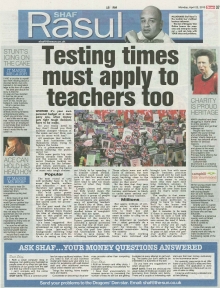My Column
Testing times must apply to teachers too.
- Date: Monday 22nd April 2013

Government ready to give teachers a lesson in economics?
Whether it’s your own personal budget or a company one, when money gets tight tough decisions have to be made.
Do you really need to buy that? Could you find another cheaper version of the same service? How can you do more with less? All questions that individuals and businesses ask themselves when trying to balance the books.
It’s a phenomenon currently affecting the public sector too. With some pretty big cuts having already been made but the squeeze on public sector finances looking set to continue for the foreseeable future, politicians are now staring down the barrel of some very tough choices.
The next round of cuts will probably have to be ones in areas like health, welfare and education - and are therefore not going to be very popular with anyone.
But with great power comes great responsibility, so someone is going to have to be prepared to give a few sacred cows the proverbial chop.
In the past week the UK government education secretary floated the idea of changing school days so that pupils are in class for longer and have fewer holidays.
It’s been suggested that this would help educational attainment as well as saving those from less well-off backgrounds from suffering long breaks out of class with little to do seeing as they are not likely to be spending it in sunnier climes abroad.
No school pupil would ever vote for that, but most don’t have a say so politicians don’t tend to take too much notice of what they think anyway.
Longer classes and terms for kids would mean the same for teachers though, and that’s a group of people who do have some clout.
Governments are generally wary of upsetting teachers as there’s lots of them, they are organised people and are all good at writing strongly-worded letters of complaint when they are upset.
They are also seen as the guardians of the country’s future generations so are afforded a special protected status that even few of their public sector colleagues enjoy.
Over the past few years the government has been trying to save money by reforming teachers pensions. Those efforts were met with howls of derision, but how many private sector workers enjoy anything close to the benefits teachers currently enjoy on that score?
So the idea that they may have to work longer days and lose some of their hefty holiday entitlement is likely to cause some serious outrage among many teachers.
But again millions of private sector workers have already had to take similar hits to their pay and conditions over the past few years in order to cling on to their jobs.
As important as teachers are, most genuinely do a sterling job, they just can’t be immune to the financial constraints facing the country.
Even if their working hours were reformed and brought into line with more regular business practices they would still be well paid compared to other workers.
No one seems to really know why they have such long holidays anyway, it just seems to be a historic situation left over from days gone by that’s never been tackled.
The reality is that someday in the not-too-distant-future some politician is going to have to take the bull by the horns and attempt to make changes to the timetables, but it remains to be seen if there is anyone big enough to take on such a task and run the risk of annoying parents across the land if teachers went out on strike.
It’s a tricky one alright but it’s a big test that the government is either going to pass or fail when the general public marks their cards at the next election.
| Related Content Video: What is a Board of Directors? |

